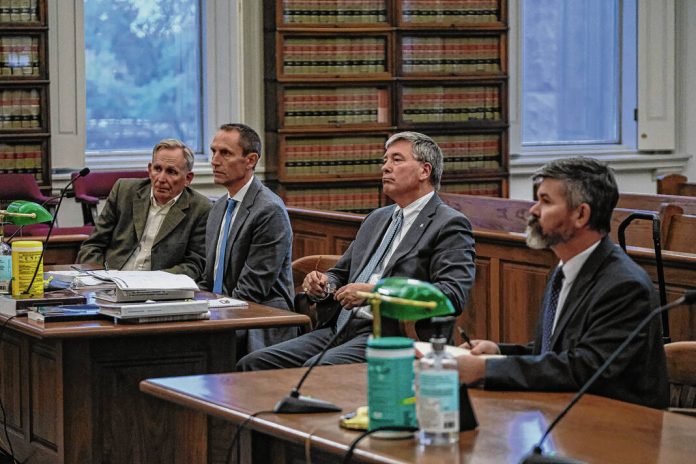
Mike Wolanin | The Republic Columbus City Council District 6 candidate Joseph Jay Foyst, from left, his attorney George “Jay” Hoffman III, attorney Peter King, representing the Bartholomew County Election Board, and attorney Ross Thomas take part in a pretrial hearing for Ross Thomas’ lawsuit against Joseph Jay Foyst and the Bartholomew County Election Board at the Bartholomew County Courthouse in Columbus, Ind., Monday, Oct. 16, 2023.
Bartholomew County Democratic Party Chair Ross Thomas has filed a brief with the Indiana Court of Appeals in a lawsuit challenging the candidacy of Republican Joseph “Jay” Foyst, who was elected to the Columbus City Council in November amid a legal fight over his eligibility.
In the brief, filed in the Indiana Court of Appeals, Thomas argues that Foyst’s candidacy for Columbus City Council District 6 “should be declared null and void” and that Bryan Muñoz, the Democratic nominee for District 6, “should be declared the winner of the 2023 election.”
Thomas is seeking to overturn the Jan. 17 decision by Special Judge K. Mark Loyd, who ruled that an additional Republican caucus in which Foyst was elected to fill a vacancy for the party’s nomination for District 6 met requirements under state law.
The brief is latest action in a legal battle over Foyst’s candidacy that started this past summer, when Thomas filed a formal challenge against Foyst, arguing that his candidacy was invalid because the Bartholomew County Republican Party had failed to follow state election laws in the run-up to a caucus in which he was selected as the party’s nominee for District 6.
Foyst was selected as the Bartholomew County Republican Party’s nominee during a party caucus this past July. The caucus was convened after no Republican filed to run for the office in the party’s May primary, leaving a vacancy in the Nov. 7 general election.
In his initial challenge, Thomas argued that local GOP officials failed to file a required notice of the party caucus with the Bartholomew County Clerk’s Office before a state-imposed deadline. In August, the Bartholomew County Election Board upheld Thomas’ challenge and removed Foyst from the ballot.
However, the Bartholomew County Republican Party decided to hold another caucus and selected Foyst once again to fill the vacancy, pointing to a section in the Indiana Code that allowed the GOP to fill the vacancy following “the successful challenge of a candidate.”
Thomas then attempted to challenge Foyst’s candidacy again, but his request was denied by Bartholomew County Clerk Shari Lentz because the deadline had passed to file a challenge, prompting Thomas to file a lawsuit against Foyst and all three members of the Bartholomew County Election Board, including Lentz.
The case was initially assigned to Bartholomew Circuit Court Judge Kelly Benjamin, who recused herself. The case was later turned over to Loyd, the special judge. In November, Loyd dismissed the claims against the Bartholomew County Election Board, leaving Foyst as the lone defendant.
In January, Loyd upheld Foyst’s candidacy, finding that the second Republican caucus in which Foyst was elected to fill a vacancy for the party’s nomination for District 6 met requirements under state law. Thomas then appealed the special judge’s decision.
The dispute largely centers around the interpretation of Indiana Code 3-13-1-7(b)(7) and the extent to which it applies to Foyst. The the law states that a political party may take action to fill a ballot vacancy within 30 days following “the successful challenge of a candidate,” provided that the vacancy is filled more than 13 days before the election.
Thomas argues in the brief that the provision does not apply to Foyst because he was “never a valid candidate.”
Thomas points to a 1985 decision in a dispute over a Republican candidate for Clay County Recorder. In that case, Republicans attempted to fill a ballot vacancy for the general election but missed the filing deadline.
However, the Clay County clerk accepted the late filing, and the Republican candidate, Ruth Mohr, ended up defeating the Democratic candidate, Harold Gene Wilhite. After the election, Wilhite filed a lawsuit, and a judge ruled that Mohr was ineligible due to missing the filing deadline and awarded the election to the Democrat.
The judge ruled that “failure to comply with the time frames specified in (Indiana election law) makes the nomination void and of no effect. Mohr was never a candidate for the office of recorder. …The candidacy never existed in the eyes of the law in the first instance.”
Thomas also highlighted an Indiana Supreme Court decision in 1985 in which the high court found that a Republican who won the 1984 election for Brown Circuit Court judge was ineligible to hold the office due to missing a filing deadline.
“Missing the deadline ends the game,” Thomas states in the brief. “(Foyst) was not a candidate validly on the ballot, and he is not a candidate. Like Mohr, ‘the candidacy never existed in the eyes of the law.’ Clearly then, a ‘successful challenge of a candidate’ would only apply to someone that was at some point a valid candidate on the ballot, not a ‘candidacy that never existed’ because it was untimely.”
Foyst’s attorneys have 30 days to file their own brief, though that deadline can be extended. As of Tuesday morning, the case was pending before the Indiana Court of Appeals




